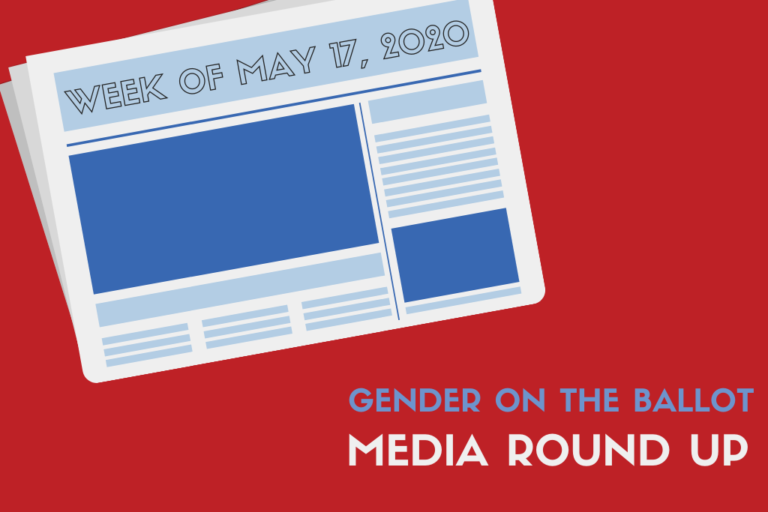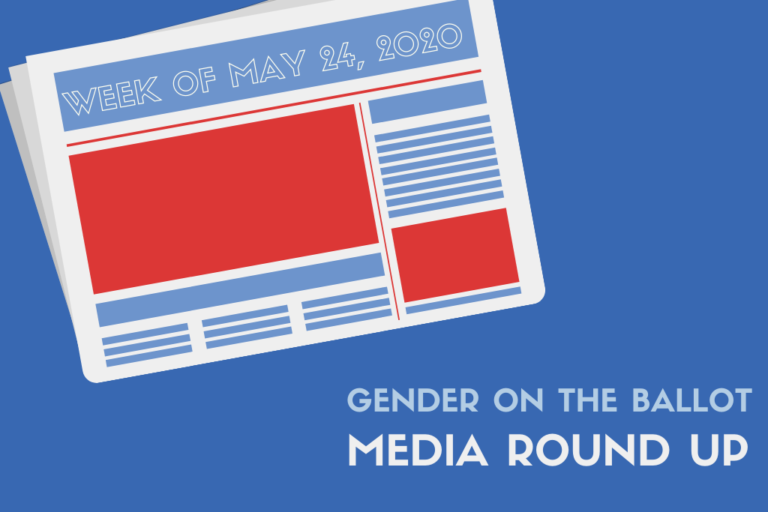Happy Friday! Welcome to our Media Round Up. Each week we’re collecting and sharing our…
Media Round Up: Week of May 30th

Happy Friday! Welcome to our Media Round Up. Each week we’re collecting and sharing our favorite gender + politics stories. Here’s what caught our eye this week:
It’s Time for a Whole-of-Government Approach to Address Period Poverty in the U.S.
Rep. Grace Meng, Chelsea Vonchaz and Jennifer Weiss-Wolf, Ms. Magazine
Period poverty in the United States is a rampant problem that remains mostly unchecked. A 2019 study by the American College of Obstetricians and Gynecologists reported that 46% of low-income women in St. Louis had to choose between buying food and buying tampons and pads. Homeless people have described using menstrual products for longer than they should or substituting with newspapers and paper bags. The COVID-19 pandemic has made this inequality even worse, with women of color bearing the brunt of the lack of access to these essential items.
You can read the full article here.
For America’s 1st Indigenous transgender lawmaker, Pride is ‘a statement of survival’
Julianne McShane, NBC News
Rep. Stephanie Byers made history in November when she won her election, becoming the nation’s first transgender Native American elected official and the first transgender person elected in Kansas. Byers, who is a Democrat, defeated her Republican opponent by 11 points in the Republican-majority state House. As a trans woman and Democrat, in the nearly evenly divided state, there was uncertainty about how the election would play out. “We’re more of a purple state than people realize — we’re just a purple state that always seems to go red,” she said. “It really is that the people are more accepting than the politics are.”
You can read the full article here.
In Tulsa and beyond, Biden tasks Black women with fighting the legacy of inequity
Errin Haines, The 19th
Tuesday was the centennial of the Tulsa race massacre and during his speech marking the occasion, President Joe Biden entrusted Vice President Kamala Harris to lead the Democrats’ voting rights efforts. Harris, who was also appointed by Biden to handle the immigrant situation at the border, is one of the many Black women in the administration who is in charge of dealing with some of the country’s most complicated and enduring issues. This serves as a public acknowledgement of Black women’s political power and leadership. Political strategist Karren Finney said, “This is what we talked about and fought for in our conversations during the election about the power of this moment for Black women. This is what happens when Black women are at key decision-making tables: We’re seen. We’re heard.”
You can read the full article here.
Black women’s next targets: governorships and Senate seats
Bill Barrow, AP
State senator Jennifer McClellan and former legislator Jennifer Carroll Foy are in the running to make history as the first Black woman elected governor in the US. They are both up against Governor Terry McAuliffe in the Virginia race, and their candidacy represents a new wave of Black women around the country who are stepping into, not only local, but also statewide leadership. In North Carolina, former legislator Erica Smith and former state Supreme Court Chief Justice Cheri Beasley are running for Senate. In Florida, U.S. Rep. Val Demings is challenging Senator Marco Rubio and in Georgia, voters await the possible return of voting rights activist Stacey Abrams in a second run for governor.
You can read the full article here.
Here’s How Deb Haaland Wants to Address the Crisis of Violence Against Indigenous Women
Piper McDaniel, Mother Jones
The rate of violence against Alaska Native and American Indian women in the US is dangerously high, with murder being the sixth leading cause of death for Native women younger than 45 years old and the fourth leading cause of death for Native women under 19 years old. Interior Secretary Deb Haaland, the country’s first Native American Cabinet secretary, is pushing new efforts to address the many unresolved cases of dead or missing Indigenous women, establishing the Missing and Murdered Unit within the Department of the Interior to focus on these cases. “Violence against Indigenous peoples is a crisis that has been underfunded for decades. Far too often, murders and missing persons cases in Indian country go unsolved and unaddressed, leaving families and communities devastated,” Haaland said.
You can read the full article here.






